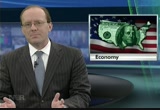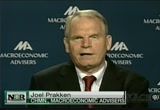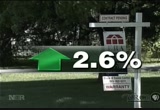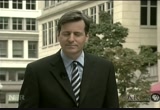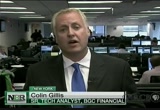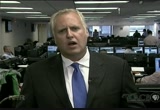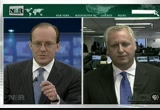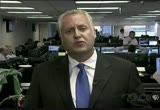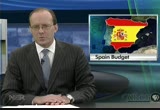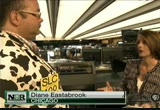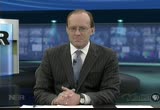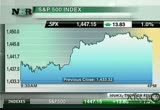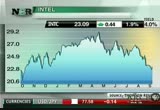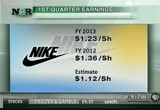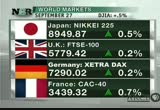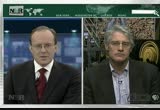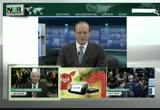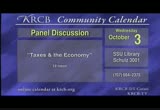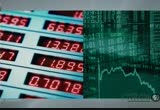tv Nightly Business Report PBS September 27, 2012 4:30pm-5:00pm PDT
4:30 pm
we begin with discouraging news about the sluggish economy. by the broadest measurement, economic growth slowed sharply in the second quarter. the gross domestic product was revised considerably lower today. growth was 1.3% in the april through june period. just a month ago, the estimate was 1.7%. add that to a big drop in purchases of big ticket items, like washing machines and furniture. in august, durable goods orders fell 13.2%, and you've got an economy that's just muddling along. but one ray of encouragement-- fewer people filed for unemployment benefits for the first time last week. clai fell by 26,000 to their july lows of 359,000 claims. on wall street, the dow jumped 72 points, the nasdaq added almost 43 points, the s&p up 13. while the u.s. continues working through problems left over by the great recession, there are big new challenges ahead in the
4:31 pm
form of the fiscal cliff and the ongoing mess in europe. darren gersh tonight takes a look at the risks ahead and the prospects for the economy's one clear bright spot, housing. >> reporter: this muddle-through economy of ours is going to become even more muddled in the months ahead. the latest readings on durable goods show businesses are clearly worried about hiring people and buying new machines in the face of the looming battle over federal spending and tax cuts known as the fiscal cliff. >> we need to get past the election, we need to get past the fiscal cliff, have some certainty about the conduct of fiscal policy over 2013, and maybe see some further progress in europe to lift this veil of uncertainty that's holding back both businesses and households. >> reporter: at the margin, the falling number of people filing for unemployment insurance is likely to bolster consumer confidence. but economists are looking for about a 100,000 increase in payrolls in the september employment report out next friday. call that a guarded outlook. >> in the fourth quarter, we
4:32 pm
think job growth is going to pick back up. we have had some sluggishness in job growth in recent months. ultimately, we do expect businesses to feel they need to hire somewhat more. that, we think, will resume a downward trend in the unemployment rate. so we think the next move on job growth is up rather than down. >> reporter: the bright spot in the economy is housing. pending home sales slipped 2.6% in august, but that was still a better reading than last year at this time. overall home prices, sales and construction are all trending up. >> so housing is a significant contributor now, both in terms of construction, directly to gdp growth in that way. but also, the turn in house prices is going to, over time, make consumers feel wealthier and lead to better consumer spending. >> reporter: but one bright spot is not enough to declare the muddle over. >> the concern i have here is can housing levitate by itself if the rest of the economy
4:33 pm
doesn't come along for the ride, in particular, if we don't start getting strong employment gains and strong income gains? are all those other positive developments in housing enough to power residential construction upwards? and i don't think they are. >> reporter: here is one small piece of good news. revised figures from the bureau of labor statistics show, as of march this year, the economy created 386,000 more jobs than previously reported. that makes the jobs picture look somewhat better than we thought. darren gersh, nbr, washington. >> reporter: i'm erika miller in new york. coming up, we'll hear from italian prime minister mario monti on the future of the euro. is italy better off with the euro or without? there was a time not so long ago the blackberry device was a korpts status sim bon then came itsix phone and android system. after the closing bell research in motion reported it lost money for the third quarter in a row.
4:34 pm
but it lost a lot less money than feared. losses were 27 cents per share, that's about 20 cents less than analysts estimate. and perhaps most encouraging after months of delays the company said its newest blackberry device is still on track now to launch in the first quarter of the year. colin gill sis with us, senior technology analyst at bgc financial, he joins us from that firmment dow agree, results not as bad as feared? >> absolutely. its company lives to fight another day. when you look at the results, there were several glimmers of positive notes you could take away including an increase in the cash position and an increase in the total number of describers. >> i want to ask you about the cash position here because it has been building pretty steadily over the past four quarters and we'll look at that now from 1.5 billion about a year ago to over 2 billion dollars in this last quarter. but when you lead with your cash position as opposed to your business, how strong is the underlying business?
4:35 pm
>> you know, that is one of the concerns for investors. would the company be burning through its cash and they have not done that they've been able to grow that balance. what that does is it gives a level of comfort to all the stakeholders. customers to their partners, that this company is going to be here, you know, for the foreseeable future. the company is still deep in a transition to its new platform, the black berry operating system that will be more expect wive apple and the google android phone so to have that cashin sures a level of comfort to people while they go through that process. >> tom: you also mentioned subscribers as one of the glimmers of hope here. and earlier in the week mentioned 80 million subscribers. but really isn't the question here, colin, the ability to grab market share. it has continued to see its market share erode down to 10% in the united states now compared to google and apple which have been growing their share. >> well, there is positives in the results and it was nice to see the total
4:36 pm
subscriber base grow to that 80 million it is important to remember that the company still saw revenue decline by 31% on a year-over-year basis. the number of units that were shipped, that 7.4 million for the entire quarter that compared to the 5 million apple sold and on its first weekend of sales are for thix phone 5. so this is a company that has-losing share, people view the platform as being behind the curve technologically and they still have a lot of ground to cover to catch up. >> does it have any price pog we are when it comes to its new device the blackberry -- in other words, it may not make it up on volume but can it continue to see margins and perhaps even increase margins within the company posted a loss this quarter and the expectations are they are going to post a loss in the next your as well. so they are not driving a profit with their current cost structure. this is something they have been trying to change. and we'll see what happens when 10 hits the marketplace there say big battle for that number three ecosystem
4:37 pm
slot. you have apple and google's android and the third spot is either going to go to research in motion and it will go to a platform like microsoft with their windows 8 and they're pushing hard to get traction on the enterprise market. >> what do dow with shares of research in motion if you own them or looking at them at these price levels down 75% from where they wre a year ago. >> it's definitely a beaten up stock. more than half of its value is in its cash position. unfortunately, though, when you still have uninternt its ability to get traction with its new phones, the 10 operating system, you have to be cautious of it. let's wait and see if they are able to, you know, get some adoption in the marketplace with their new phones when they come out in the first quarter of 2013. >> do you have a position either long or short. >> we do not. >> tom: cole sync wit bgc finance.
4:38 pm
>> tom: violence erupting this week in spain and greece over government austerity measures are reminders the european debt crisis is far from solved. today, spain unveiled its 2013 budget, promising more big budget cuts as the government tries to reduce its heavy deficit. as turmoil and tension in the euro-zone escalates, there remain questions about the longevity of the euro currency. today, italian prime minister mario monti said he doesn't think any country will leave the union. erika miller reports from new york. >> reporter: as italian prime minister mario monti left today's event, he dodged reporters and walked straight to a waiting car.
4:39 pm
earlier at the forum, it was a different story. calm, cool and collected, monti stayed carefully on message. he made it clear italy is better off as part of the european union. >> the euro brought to italy a single currency, shared with all the others, that is very important economically. >> reporter: monti also emphasized the benefits of the common currency for other member countries, like germany. >> thanks to the euro, germany was able and is able to have a huge european market free from the risk of competitive devaluations. >> reporter: euro-zone worries have roared back this week, thanks to violent demonstrations in spain. today, the spanish government presented its new budget, which includes $51 billion in spending cuts. the government also plans to borrow nearly $4 billion from the country's pension reserves to cover liabilities. what's clear is the euro-zone's
4:40 pm
crisis isn't going away soon. >> it's probably going to be another six, 12, 18 months before its finally resolved. and by "resolved," i mean they consolidate into some kind of fiscal coalition, and maybe there's some kind of debt mutualization and what have you. so, we are still quite a ways away from that. >> reporter: at today's event, monti was asked whether he thinks greece will eventually leave the e.u. he said no, but didn't discount the possibility entirely. >> i believe that were it to happen, it would be damage to the whole system. >> reporter: monti said he won't run for re-election, but he didn't completely close the door on another term. he was appointed prime minister by the italian president, and says if the president wants to reappoint him, he would consider serving another term. erika miller, nbr, new york. >> tom: this week, we've been looking at the november election through those closest to the
4:41 pm
market action, traders in the pits. tonight, diane eastabrook takes us to the corn options pit in chicago for a conversation with one veteran trader. >> reporter: grain trader scott shellady is more concerned about how much corn drought-stricken midwest farmers will harvest this fall than which presidential candidate is leading in the polls. still, shellady admits issues like trade, the fiscal cliff, and the government's ethanol mandate could impact these markets. >> are you getting an indication from either candidate that they are going to have a change in policy regarding ethanol? >> absolutely not. not in the short term, no. and it's really due to the fact that i think the government got in bed with the ethanol producers and helped them build plants, and it's been such a large mandate that i don't think they can pull the rug out from under them just because we have one dry year. so, i don't think they're going to change anything in the short term for sure, and i think we'd have to have a problem or a drought for two or three years for them to really sit down and take another look at it. >> reporter: a lot of investors
4:42 pm
are concerned about the fiscal cliff, and they're also concerned about the ending of these bush tax cuts. as a grain trader, is that a concern for you, for this market? >> yes, and it didn't used to be this way, but because of the money flows... you know, we trade corn, we say we trade corn, but a lot of guys are trading the money flows. and the reason we are up here and a lot of the reason why these prices are so high for commodities, just generally speaking, is because you can't get any return on your ten-year bonds because it's at 1.6%; you can't get a return on your equities, or you hadn't as late because it's too risky and you weren't getting what you wanted out of it. so a lot of the investment money came flooding toward the commodity market. so, we kind of have to pay attention to that. and that also has to do with the economy. if the economy is doing well, there's more money sloshing around, you're going to see more speculation and you're going to see more business. >> reporter: are any elements of the election being priced into corn at this moment, or is this all drought and supply and demand driven? >> we are in harvest mode right now, so we're just really more
4:43 pm
concerned with what the bushel counter is saying in the combine than what legislator is saying on the stump. so right now, we're just trading harvest and what we think, and ultimately what we think the crop will be when we pull it out of the ground. >> reporter: scott, thanks so much. >> all right. thank you. >> tom: tomorrow, "politics in the pits" continues from chicago's livestock trading pits-- presidential politics, cattle, and pork bellies. the secutiesnd exchange commission is taking a closer look this fall at the systems and computer programs brokerage firms use to place orders. the move comes after the big trading trouble at knight capital last month, when a systems update gone bad unleashed a flurry of bad trades. those bad trades lead to a loss of $440 million at knight. according to "the wall street journal," the agency has in recent days requested details from major broker-dealers and trading firms about internal controls on their computerized trading systems.
4:44 pm
one group of union members are back at work tonight, the regular nfl referees. a tentative agreement was announced today, just days after questionable calls by replacement refs on monday night football costing the green bay packers a win against seattle. nfl commissioner roger goodell apologized to fans, adding that everyone is ready to get the officials back to work. >> i think everybody wanted it-- the officials wanted to get back on, and i believe we would have reached an agreement this week, regardless of monday night or sunday night or the past weekend. >> tom: the tentative eight-year
4:45 pm
agreement puts an end to the lockout, which began in june. separately, an update on the dispute between national hockey league players and management-- the lockout continues. today, the league cancelled the entire 2012 preseason. despite the discouraging gdp report, stocks were higher. we learned china's central bank added a record amount of money to its banking system this week, adding to global central banks acting to stimulate their economies. the s&p 500 traded in positive territory for the entire session, shrugging off the u.s. economic data. the inx finished higr by 1 trading volume was 633 million shares on the big board; almost 1.7 billion on the nasdaq. the technology sector led the gains, up 1.6%. then, it was energy and materials, both closely tied to the global economy, up 1.3% and 1.2%, respectively.
4:46 pm
the biggest percentage gainer of the dow industrials was general electric. the company slightly increased its forecast for revenue growth, even as the global economy remains choppy. that kind of optimism helped shares jump 2.9%. g.e. said its industrial businesses are gaining momentum. the shares certainly have been. tonight, they're at their highest price in four years. meantime, struggling dow industrial stock intel found buyers, up 1.9%. earlier this week, it traded at its lowest price this year. intel unveiled a new semiconductor for tablets, counting hewlett-packard, dell, and samsung among its customers. intel has been criticized for not moving faster into the tablet space. tomorrow is the end of the calendar third quarter, but we're seeing a handful of companies turn in their fiscal quarter results. discover financial found more customers were using their charge cards. earnings were stronger than
4:47 pm
expected acustomers used their discover cards more and credit card loans increased. shares responded up rallying 7.3% on heavy volume. this is an all-time high for discover. meantime, nike saw a more muted reaction to its quarterly earnings. nike shares were up a half percent. they were at an all-time high in may. earnings were a $1.23 per share, 11 cents better than estimates. but they dropped from a year ago. one concern highlighted by analysts is nike's global future orders, a sign of sales to come. they showed the smallest gain in almost three years. a mattress merger was in focus today. tempur-pedic international will buy competitor sealy as it looks to expand its product line. the buyer, tempur-pedic, will spend $242 million for sealy, and take on sealy's $750 million of debt. the deal offers sealy sheholde $2.20 per share, a small premium. the buyer got a lift-- shares of
4:48 pm
tempur-pedic rose 14.4%. still, they trade at half the price compared to a year ago. sealy shares closed just a penny shy of the buyout offer, up a modest 2.3%. the two companies will operate independently. four of the five most actively traded exchange traded products were up. the emerging markets and russell 2,000 funds each gained more than 1%. and that's tonight's "market focus." >> tom: better than stocks, better than gold-- silver, this year, has been a sterling
4:49 pm
performer, rising more than 23% since january. we spoke this week with phil baker, c.e.o. of hecla mining. we started by asking him where the bulk of silver demand is coming from, investors or industry? s well, right now the real driver of demand is investment demand because silver like gold is money. it's really money for the common man. and you see the consumption of silver in investment demand in a way that we have not seen before. and it's growing. as people are enthusiastic over the future price for silver. >> is that sustainable especially when it sees the future price higher for industrial demand and what we are already seeing with a soft economy worldwide? >> i think it's definitely sustainable. it's really for two reasons. first the reasons we have the quantitative easing are not going to go away any time soon so you will see
4:50 pm
continued interest in going the gold, going to silver as a store value and the products that use silver are just expanding at an extraordinary rate. you know, if you think about something like the iphone or a tablet, that was a product that didn't exist 150 years ago. and it's coming out with new versions of that every few years. and with that comes consumption of more silver. >> net-net though is this replacing the consumption of silver that came from the photography world that disappeared as we moved towards digital photography or are you seeing a net increase of industrial demand? >> well, you're seeing both. over the last ten years it's been really a replacement of the photographic demand that was in a decline from about year 2000 and it continues to decline today. but on an aggregate basis
4:51 pm
you are seeing and increase in the demand for silver. we're consuming right at a billion ounces of silver per year. >> lucky friday is as in the name of some saloon out west is the name of a pine that you have in idaho that has been shut down for safety repas. when is production going to restart there? >> yeah, production will restart at the end of the year. this is a mine that has been operating since 1942. it's a mine that as we go deeper the grade of the ore body goes up and you're going to see this mine not only restart next year, in full production by midyear but you're going to see it increase production by about 60% by 2016 and you're going see the cost structure go down with that increased production. and you're going see a mine that will operate for i would expect another 20, 30, 48 years. it's a remarkable ore body. >> you're seeing higher investment demand. you're seeing industrial
4:52 pm
demand. what about hiring, are you going to add to the payroll? >> we have, in fact, added to the payroll. we've been consistently adding employees even during this time of the lucky friday being down, we've added to the technical staff of the company. and we'll continue to do that. >> we'll leave it there. phil baker, the cees of heckla mine. tomorrow on nbr, we wrap up our coverage of mine expo in las vegas with frank mcallister, c.e.o. of platinum and palladium miner stillwater mining. also, child's play for the nation's retailers looking for big profits. we talk holiday toys. and sam stovall is our friday "market monitor." he'll wrap up wall street's third quarter and look ahead to the end of the year. in "kids & cash" tonight, there's the birds and bees talk, and then there's the money talk. how do you answer touchy finance
4:53 pm
questions from the kids-- "mom, how much does our house cost?" "dad, how much money do you make?" here's alisa weinstein, author of "earn it, learn it." >> we know our kids are more likely to open up when we're not staring at them, which makes car rides a great time to ask those tough, uncomfortable questions. though sometimes, its not us who's doing the asking. recently, my seven-year-old asked me how much our house costs. i was stunned silent. i'm rarely stunned silent. do i tell her? what will she think? do i not tell her? will she tell her friends? do i care if she tells her friends? and it immediately reminded me of how parents are more comfortable talking to their kids about sex than they are about money. but why? well, sex talks can be embarrassing, but in a different way than money talks. our society wraps so much of our identity into what we make and what we own, so separating our financial worth from our self- worth can be really hard to do, let alone explain to a kid. though i still feel hiding our financial decisions sends the wrong message.
4:54 pm
it says money is some secret, adult-onlyorld children just can't handle. of course, there needs to be discretion-- they're kids. but lots of great concepts can come out of these uncomfortable conversations, like how we bought during a seller's market, and chose a town home instead of a single family home. so? did i tell my daughter how much our house cost? would you? let us know us on facebook and twitter @bizrpt. i'm alisa weinstein. >> tom: finally tonight, happy birthday to google. the web giant is 14 today. to celebrate, it's serving up a gital slicof cake. from researching for business to finding the nearest latte and sending email, google has become a part of our daily lives with its mission to "organize the world's information and make it universally accessible and useful." fulfilling that mission has taken google from an $85-per- share initial stock offering to a lifetime closing high tonight
4:55 pm
of $756.50 a share. that's a 790% gain since its market debut. at'snightly business report" for thursday, september 26. good night, everyone. we'll see you online at nbr.com, and back here tomorrow night. captioning sponsored by wpbt captioned by media access group at wgbh access.wgbh.org >> join us anytime at nbr.com. there, you'll find full episodes of the program, complete show transcripts and all the market stats. also follows us on our facebook
4:57 pm
4:58 pm
4:59 pm
184 Views
IN COLLECTIONS
KRCB (PBS) Television Archive
Television Archive  Television Archive News Search Service
Television Archive News Search Service 
Uploaded by TV Archive on

 Live Music Archive
Live Music Archive Librivox Free Audio
Librivox Free Audio Metropolitan Museum
Metropolitan Museum Cleveland Museum of Art
Cleveland Museum of Art Internet Arcade
Internet Arcade Console Living Room
Console Living Room Books to Borrow
Books to Borrow Open Library
Open Library TV News
TV News Understanding 9/11
Understanding 9/11